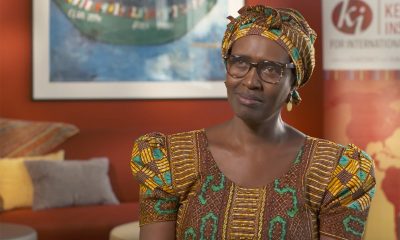Southeast Asia
Singapore government to decriminalize homosexuality
Prime Minister Lee Hsien Loong made announcement on Sunday
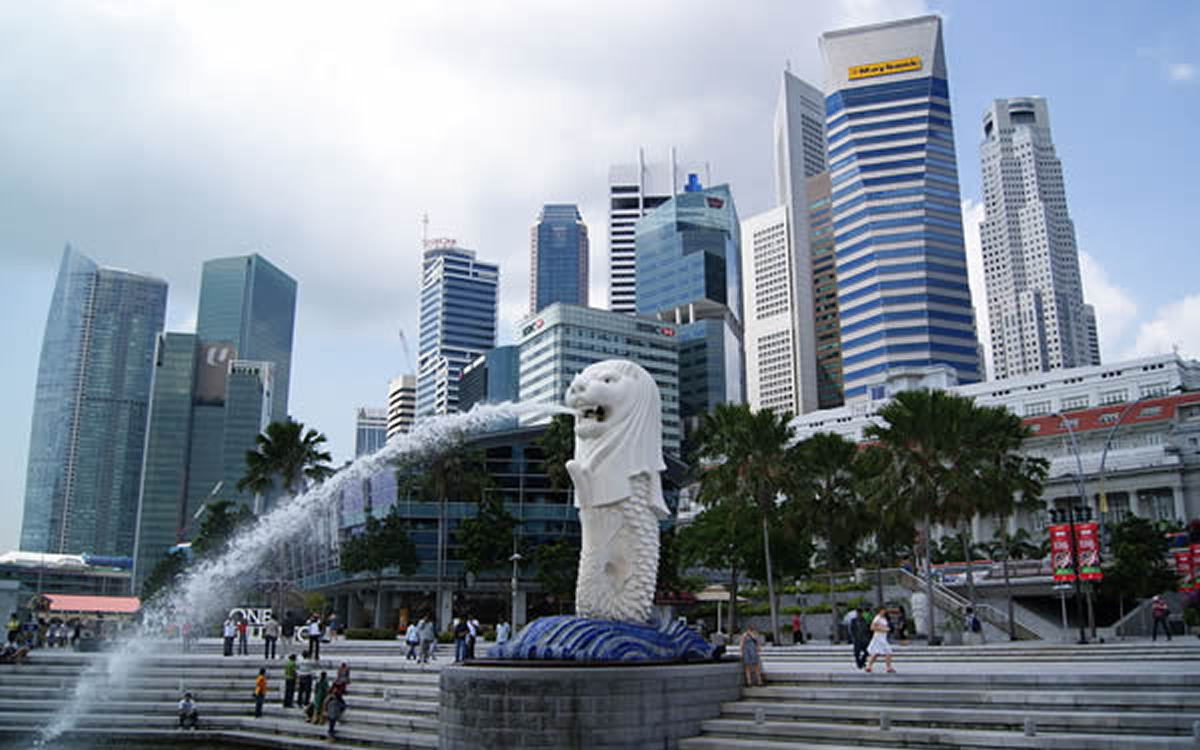
SINGAPORE — Singapore Prime Minister Lee Hsien Loong on Sunday announced his country will decriminalize consensual same-sex sexual relations.
Lee made the announcement during his speech at a rally that marked National Day, which commemorates Singapore’s independence from Malaysia.
“Private sexual behavior between consenting adults does not raise any law and order issue. There is no justification to prosecute people for it nor to make it a crime,” said Lee. “This will bring the law into line with current social mores and I hope provide some relief to gay Singaporeans.”
Singapore’s Court of Appeal in February upheld a lower court decision that dismissed three lawsuits against Section 377A of the country’s colonial-era penal code. Home Affairs Minister K Shanmugam during a June 29 interview with the BBC said his country will not prosecute anyone under Section 377A.
Lee on Sunday said his government will amend Singapore’s constitution to define marriage as between a man and a woman.
“We are grateful that the Singapore government will repeal Section 377A through Parliament,” said Leow Yangfa, executive director of Oogachaga, an NGO that works with LGBTQ+ and intersex people in Singapore, on Sunday in a press release the London-based Human Dignity Trust released. “This means a lot to the LGBT community.”
Human Dignity Trust works to promote LGBTQ+ and intersex rights in countries that criminalize consensual same-sex sexual relations.
“Decriminalization will not only improve the lives of LGBT people and their families, but will bring other obvious benefits to business, trade and Singapore’s international reputation, making this announcement welcome on many fronts,” said Yangfa. “We eagerly look forward to constructive debate in Parliament in the coming months.”
Southeast Asia
Thai marriage equality bill receives final approval
Country third jurisdiction in Asia to allow same-sex marriages
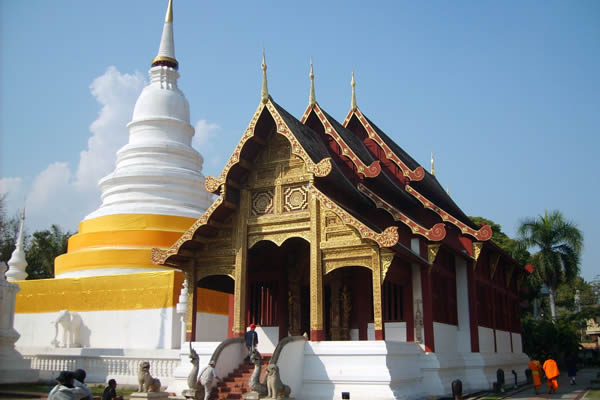
BANGKOK — The Thai Senate on Tuesday overwhelmingly approved a bill that will extend marriage rights to same-sex couples.
The measure passed by a 152-130 vote margin with four senators voting against it and 18 abstaining. The Thai House of Representatives in April approved the marriage equality bill, with 400 of 415 lawmakers who participated in the vote backing it.
Taiwan and Nepal are the two other Asian jurisdictions that allow same-sex couples to legally marry.
Southeast Asia
Thailand’s transgender community struggles to find health care
Thailand trans folks are left with a choice between non-gender-affirming public hospitals or LGBTQ-friendly private hospitals & clinics
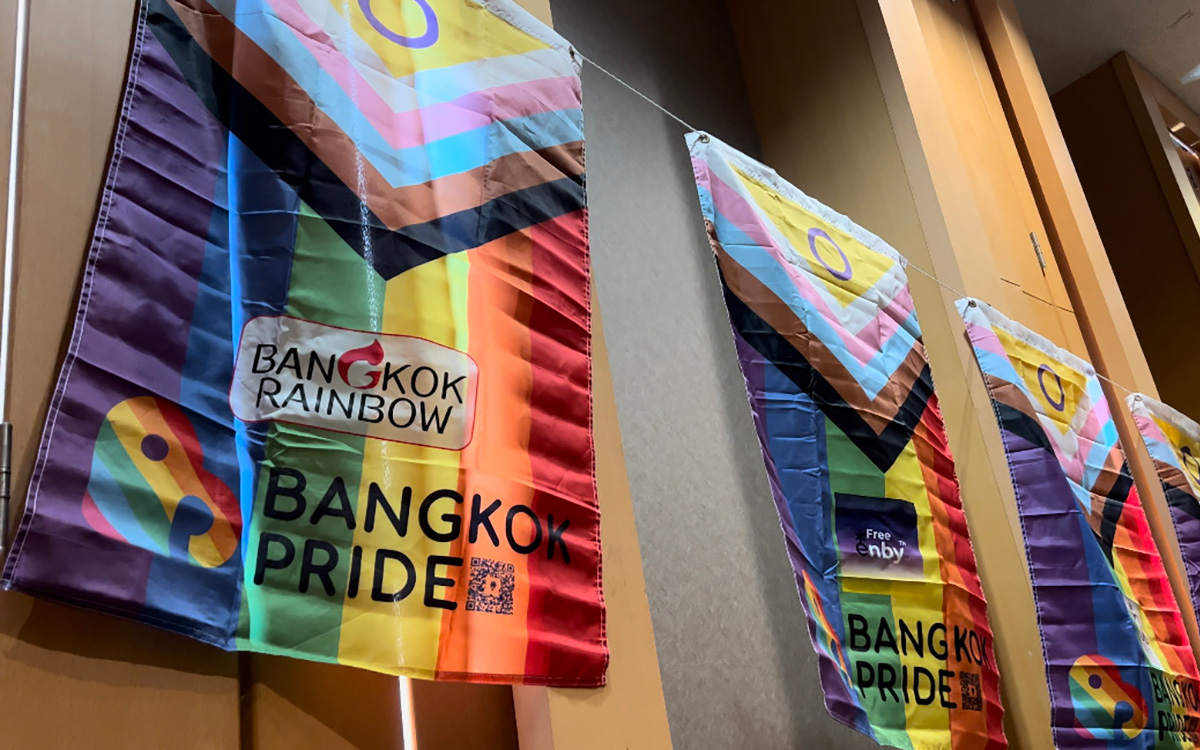
By Sararat Tosakoon | WASHINGTON – Thailand, renowned for its welcoming travel destination for the queer community and its embrace of gender diversity, presents a paradox for its transgender population.
Despite a perception of acceptance, the reality for trans individuals in the country reveals a landscape marked by challenges in gender-affirming care, gender recognition and healthcare access that impacts their overall health.
With two decades of activism under her belt, Nachale Boonyapisomparn, also known as Hua, co-founder of the Thai Transgender Alliance (ThaiTGA), sheds light on the pressure placed upon trans people to conform to societal norms, underscoring the limitations of acceptance within rigid societal structures and expectations, such as meeting certain behaviors and beauty standards.
“Acceptance still comes back to us still having to fit certain boxes,” Hua said.
A poignant example of this struggle is illustrated by Siwanon Khanvilaikul, who goes by Yok, a trans cabaret performer in Phuket who underwent gender reassignment surgery at 18 yet finds herself marginalized within the healthcare system.
“I feel biased. I am a woman in every way, but why is the final judgment based on that one small title [Mister] in front of my name?” Yok questions, highlighting the frustration of being relegated to a male ward in public hospitals due to outdated bureaucratic classifications as a result of the lack of gender recognition.
Yok cannot change her gender identity and prefix on government and legal documents, such as passports, birth certificates, identification cards and health forms. This inability to modify gender markers contributes to biased treatment within the healthcare system, creating an atmosphere of discomfort, isolation and frustration for trans individuals.
“When I am going in for care, my mental and emotional state is just as important,” said Yok.
Beyond the limited gender recognition, the lack of gender-affirming care further compounds the challenges trans people face in a healthcare setting. Kritima Jemma Samitpol, who goes by Jemma, a supervisor of the Tangerine Clinic, Thailand’s first trans-led community health clinic, emphasizes the dearth of trans-competent healthcare and the reliance on informal sources for medical guidance, such as TikTok, Facebook and friends.
“This is a problem,” Jemma declares, noting the risks posed by misinformation on hormone use within the trans community and emphasizing the need for accessible and affordable gender-affirming care to mitigate these risks.
While government-funded public hospitals are an affordable and accessible option due to Thailand’s Universal Health Coverage program implemented in 2002, providing virtually cost-free basic health prevention, screening and treatment, gender-affirming care is not mandated or covered under the current UHC plan. No gender-affirming care in public hospitals has put Yok at risk of discrimination and bias like misgendering.
Trans individuals in Thailand are left with a challenging choice between accessible and affordable but non-gender-affirming public hospitals, potentially laden with discrimination and stigma or LGBTQ-friendly private hospitals and clinics
There are LGBTQ-friendly private hospitals and clinics, but they are predominantly concentrated in metropolitan areas, such as Bangkok, Phuket, Pattaya and Chiang Mai, and are not a part of UHC. Trans individuals in Thailand are left with a challenging choice between accessible and affordable but non-gender-affirming public hospitals, potentially laden with discrimination and stigma or LGBTQ-friendly private hospitals and clinics in larger cities that come with a higher price tag.
Despite these challenges, signs of progress emerge. The Tangerine Clinic stands as a beacon of hope, providing comprehensive and affordable gender-affirming care with a “come as you are” motto, encouraging the trans community to utilize health services and manage their well-being effectively. Jemma shared that the clinic continues to engage in capacity building for 11 community-based health clinics throughout Thailand, aiming to replicate the trans health service model of Tangerine Clinic.
The clinic’s collaborative research efforts with the Ministry of Public Health is a push towards integrating gender-affirming care into the national UHC program.
“There is a clear progress happening,” Jemma said.
The fight for trans rights extends beyond healthcare, with advocacy efforts targeting legal recognition and broader civil liberties. ThaiTGA’s campaign for legal gender recognition and allied causes, including same-sex equality and decriminalizing sex work, reflects a broader struggle for human rights and social justice.
“Gender recognition is a human right needed for advancing healthcare and ultimately achieving gender-affirming care,” Hua emphasized.
In the face of entrenched discrimination and institutional barriers, the resilience of individuals like Hua, Jemma and Yok serves as a testament to the ongoing battle for trans rights in Thailand.
“We must fight,” they affirm, embodying a hopeful narrative of progress toward a more inclusive and equitable society.
******************************************************************************************

Sararat Tosakoon holds a Master of Public Health degree from The George Washington University Milken Institute of Public Health, specializing in Global Health Epidemiology and Disease Control.
She is a dedicated Pulitzer Reporting Fellow, passionately delving into the intersection of discrimination and healthcare barriers affecting transgender health in Thailand.
Southeast Asia
Malaysia bans Swiss watch maker’s SWATCH LGBTQ products
Those who own any such products produced by Swatch could face up to three years in jail or a maximum fine of RM20,000, or both, if convicted
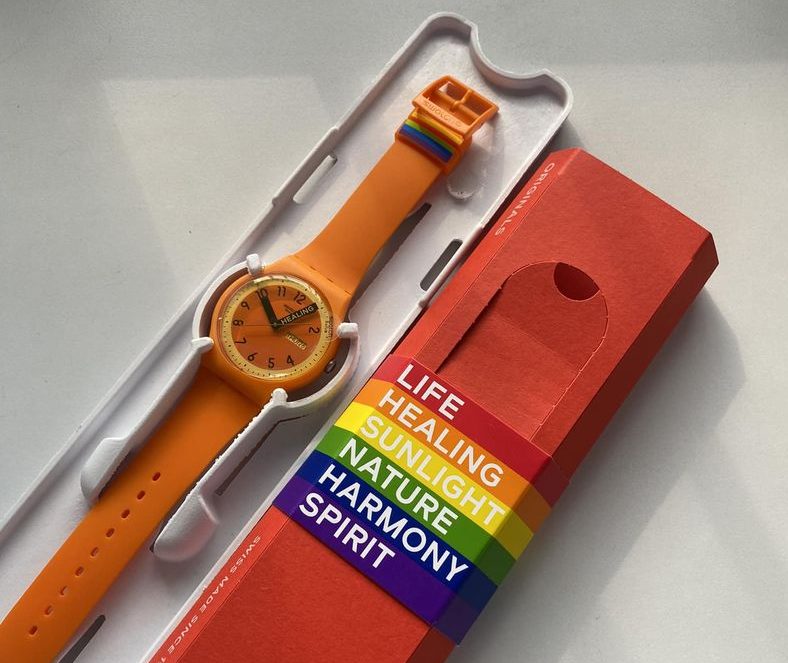
PUTRAJAYA, Malaysia – The Home Ministry of this Muslim-majority conservative Southeast Asia country, where homosexuality is illegal- punishable by punishments such as caning and imprisonment, announced that it has banned all Swiss-watchmaker Swatch products that contain any lesbian, gay, bisexual, transgender or queer elements, whether on watches, boxes or wrappers.
The ministry said the ban has been implemented under the Printing Presses and Publications (Prohibition of Undesirable Publications) Order 2023, noting that the Swatch products are “likely to be prejudicial to morality.”
“(The Swatch products) have been banned as they are detrimental, or possibly detrimental, to morality, public interest and national interest by promoting, supporting and normalising the LGBTQ movement, which is not accepted by the general public of Malaysia,” the Ministry said in its announcement.
“The home ministry again states its commitment to ensure public safety and peace by monitoring and controlling all forms of publications to curb the spread of elements, teachings and movements that contradict the local socio-cultural setup,” the statement continued.
In its announcement, the Malaysian government also warned that anyone found with or who own any such products produced by Swatch could face up to three years in jail or a maximum fine of RM20,000, or both, if convicted.
In May of this year, Malaysian authorities seized watches bearing the letters “LGBT” but, according to a lawsuit filed in July by the Swiss company, also confiscated watches from its 2023 Pride collection.
International news service Al Jazeera reported in a lawsuit filed with the High Court in Kuala Lumpur, the Swiss watchmaker is seeking compensation and the return of 172 watches seized by officials over their alleged “LGBT elements.”
Swatch said in the filing that the seizure of the watches, valued at 64,795 ringgit ($14,232), had no legal basis as well as including items that had no connection to LGBTQ activism.
“Without a doubt, the seized watches did not and are not in any way capable of causing any disruption to public order or morality or any violations of the law,” Swatch said in the lawsuit, which was filed on June 24 and first reported by the Malay Mail.
Media outlets and LGBTQ+ activists in Malaysia reported that authorities raided retail shoppes across the country including in the nation’s large mega-shopping centers.
According to Al Jazeera, Swatch Group Chief Executive Nick Hayek at the time of the filing of the suit questioned how “peace and love could be harmful” and whether authorities would try to confiscate rainbows in the sky if it was possible.
The Ministry of Home Affairs and Swatch did not immediately respond to requests for comment.
Related:
Southeast Asia
Two nights in Bangkok: The spectrum of the Thai sex industry
Male sex workers come from variety of backgrounds
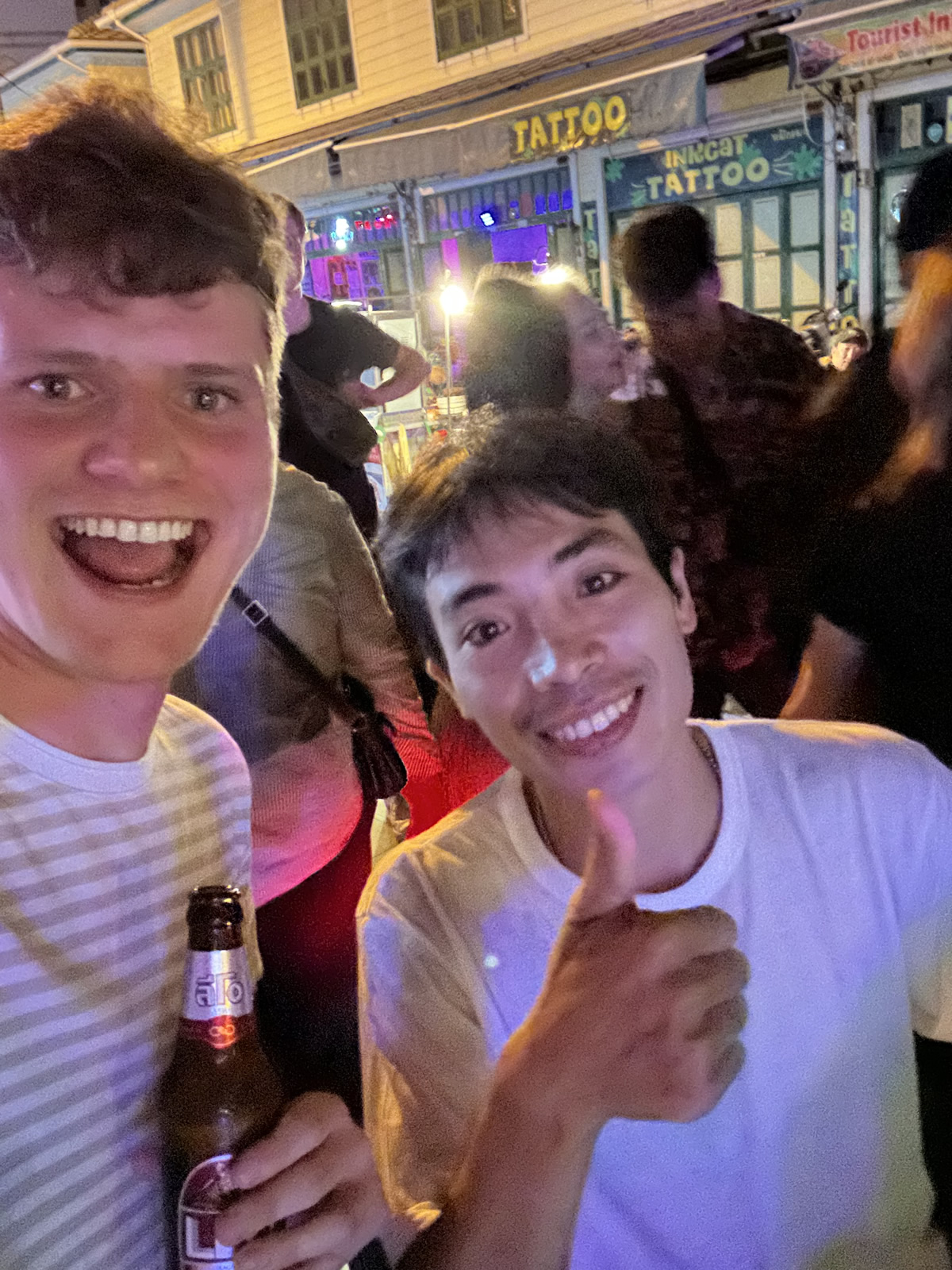
By Jack Morningstar | BANGKOK — At around 11 pm, the door knocked. “I think that’s Pop,” my friend Natalie said. She opened the door and he entered the apartment. He had a bob haircut, and smiled big, like he was trying to suffocate me with it.
“Is Pop a nickname?” I asked him. “Yes,” he said, still smiling and bobbing his head up and down. “It’s short for Popcorn.” Oh, of course. “What do you guys want to do tonight?”
I had spent most of the day touring Bangkok’s many temples. “Let’s do something fun. What’s the craziest thing you’ve experienced living here?”
Pop’s eyes lit up. He stared at Natalie and snickeringly mumbled something in Thai, which made Natalie laugh. “What? What is it? Include me!”
Pop turned back to me and explained that he had recently heard of a gay brothel, where all the men stand on a stage and you can point a laser to indicate which one you want. “Well, that does sound like a unique experience … Are we allowed to go and just talk to them,” I asked.
“I don’t see why not.” Pop googled the place, but it was closed for the night. “I have another idea. Follow me.”
Moments later, we were driving the streets of Bangkok, jamming to Pop’s Disney playlist. “Part of Your World” came on the queue. Pop looked at me questioningly. “What do you think about the new little mermaid?”
“I haven’t thought much about it,” I said. “Why?”
“I ask because some people here are angry about it. They don’t think Black people deserve to be mermaid.”
I puckered my lips contemplatively. The State Department had not briefed me on this issue. “You know what, I think they’ve earned it. They deserve to be mermaids if they want.” Pop smiled and nodded. “I agree.” We high-fived — a civil rights triumph!
“Ok, this is the street,” Pop said. Natalie put on a face mask, handing me one after. Pop remained maskless to help build trust.
We circled around the block. “Him? Him?” Pop pointed out the window at the nonchalant men loitering along the curb.
“I have no preference, whatever you want, Pop.” “Okay, I want him,” pointing at a man wearing basketball shorts, which I learned is the universal watermark for Thai male sex workers. We looped back around but someone else had snatched him by the time we got there.
“Noooo!” We all screamed. Pop buried his face in the steering wheel. After a prolonged moan, we resumed our search.
“Okay. Him.” We stopped and Pop negotiated with him for a bit before he entered the car. His name was Mai. Handsome, thin, kind eyes.
“A Million Dreams” from “The Greatest Showman” blared through the stereo. “I’m still upset that we lost the first guy,” Pop said. “Take it easy Pop. Can this guy speak English?” “No, we’re safe.”
We arrived at the motel where the parking lot was almost full. The hostess greeted us outside. “It’s 200 baht ($5.85) per person.”
“Per person?” Natalie asked. “But we’re just interviewing him.” The hostess was not buying the “interview” defense. “How many towels do you want?”
An incandescent bulb swung shyly, illuminating the hall. Doors cracked open and then slammed shut after paranoid eyes peeked out to find the coast not clear.
We got to our room. The mosquito-swarmed lights buzzed. The sheets had gone through some mileage, a Jackson Pollock with only colors that the body can produce.
Pop, totally unfazed by the bed’s condition, hopped on it, practically making snow angels in the bodily sediment. “Pop, what are you doing?”
“What? They wash them!”
There were two leather love seats by the bed. Natalie and I looked at each other, trying to recollect how expensive each of our shorts was should we decide to burn them afterward.
“You can’t get an STD from them — they’re leather,” Pop groaned. We begrudgingly sat at the very edge of the seats, minimizing contact.
Pop started asking Mai questions. I had to read Pop and Natalie’s faces to get the tone of what Mai was saying. Jaw drops, gasps, oohs.
Turns out, a hurricane of tragic circumstances brought Mai into the sex industry.
He moved to Thailand from Myanmar 10 years ago, sponsored for a work permit at a shrimp peeling facility. Every day he got to work at 8 a.m. and worked until 2 a.m., paid 3 baht for each kilogram of shrimp he separated, roughly $.09.
Desperate to build a more lucrative career, he got a 30,000 baht ($876.95) from a loan shark to start a food stand. Now working without a permit, he was unable to visit home. When his father fell sick and died he couldn’t go to his funeral. Making matters worse, he inherited financial responsibility for his aging mother.
His food stand fell under, and he had no choice but to make it back to the shrimp peeling facility. There, he met his current girlfriend. She became pregnant, adding to his financial stresses.
One day after work, he got in a cab and asked for the best place to be dropped off which was the same area where we picked him up. This is his first month in sex work, and we were his seventh customers.
Mai’s whole family thinks he’s working at a restaurant. Asking what would happen if they were to find out, he shook his head. “I’d have to explain that this was the end of the road for me. I had no other choice.”
I sensed, however, a creeping optimism from Mai. Since starting sex work, he has been able to make his loan payments, while supporting his family. Although, he still goes to bed hungry. “I don’t eat unless if I’m too tired to work, because I have to save,” he explained. He’s lost 8 kg (17.64 lbs.) these past few months.
This made Mai’s experience with his third client sting even more. After the session, Mai went to the bathroom. When he came out, his client was gone. Having just been cheated for free sex, he also had to pay for the room and the cab back to the curb.
Thai sex workers qualify for free STD testing, but Mai doesn’t qualify since he’s here with an invalid permit. He said one of his biggest concerns was getting diseases from standing outside in a long line of other sex workers while getting bitten by mosquitos. He gestured to several large welts on his arms.
Hearing this made my legs start to itch. I looked up at the ceiling to see a herd of swarming mosquitos. Looking over at Natalie, I saw she too was suffering from the same psychosomatic syndrome. She looked up if one could get STDs from mosquitoes, and confirmed that one cannot. We reassured Mai that the mosquitos were, in fact, the least of his worries.
Moving forward, Mai hopes to save enough to take care of his family, before ultimately moving back into the food industry. “My town never had good fresh food. My mother lives off dried noodles, and is very thin. I hope to someday bring her to Thailand, so I can take her out to dinner at a nice restaurant.”
The drive back to the curb was a solemn one. Pop, teary eyed, screamed “it’s too sad!” He turned the Disney playlist back on — “He Mele No Lilo” from “Lilo and Stitch” — to boost morale. At the curb, Mai waved goodbye and perched back up by his lamppost.
Pop, devastated by Mai’s story, still thought that we should interview someone else to get a more nuanced view of Bangkok’s sex industry.
The next day, we took a tuk-tuk to V-Club. V-Club. What a curious name for a gay sex parlor. Maybe it’s a bad translation, or maybe they’re trying to be facetious. From the outside, it looked like any old office building. You started to get a better sense of it in the courtyard, where a statue of a large phallus was planted in the dirt.
The lobby housed the infamous stage where a dozen-or-so shirtless men stood, winking, and waving. Periodically a laser would shoot across the room. Like a pseudo assassination, the escort would peel off the stage.
“This is craaaaazy,” I mumbled to Pop. After some arm wringing, we convinced the manager to let us both in the room. “No hanky panky!” We promised. We chose Bon: Chiseled, friendly and flamboyant.

Unlike the sex workers on the street, we didn’t have to go to a motel. This was a full-service stop. The room was nice, but steamy as hell, like someone had just showered. I winced. “Ahhhh! What is happening?!” “Sorry,” Bon said. He turned on the mini-split and the swampiness slowly began to dissipate.
After our conversation with Mai, we reflexively braced ourselves for something tragic. Bon explained to us how, if customers complain to management, for whatever reason, they’re not paid. Pop and I gasped, and bowed our heads pityingly.
“Has anyone ever complained about you?” I asked. His face grew stern.
“Noooo. Don’t be stupid!” He fell back onto the bed, and had a good long chuckle. Pop and I looked at each other, embarrassed by our former pity.
Bon leads a pretty posh life. He has a college degree, as do the majority of the V-Club employees. He had previously worked at his family’s veterinary business, but it couldn’t support his lifestyle. As a sex worker, he makes far more than his veterinarian father.
Around 80 percent of his clients are Chinese, and they come to Bangkok specifically to patronize V-Club. According to Bon, the clientele is generally attractive. “It’s really us that pick the client, not the other way around. If someone old or fat comes in we sit down, and they can’t choose us.”
What people ask for in their sessions is pretty conventional. Although he had one white client with a strange kink. Things were taking longer than they should have and, in a huff of frustration, the client asked Bon to pee on his face. “I said okay, stand over there.” Bon gestured towards the shower. “He cums so fast.” Bon was in stitches recalling this bizarre memory.
He generally meets between two and five clients per day (he only finishes with his last client), depending on the season, each paying upwards of 1500 baht ($43.85), plus benefits. Many clients bring him gifts, and some conscript his services for lavish vacations abroad.
One client paid him 40,000 baht ($1,169.27) a month for a year for exclusive access. He was given business class tickets to destinations like Hong Kong, Tokyo and Macau. He said that he considered doing Only Fans as well but was worried about his family finding out. They are accepting of his homosexuality, but sex work might push them over the edge.
Throughout our conversation, he would show us pictures of his most attractive clients. “Wait, are these photos posted on your own Instagram account?” I asked. “Yes, look at this Taiwanese model. This is him with my whole family,” he showed me proudly. “You brought your client to visit your family, the one that can’t find out you’re a sex worker?” “Yes, I couldn’t resist. He was so cute!” He told his family that they were just friends, but in one of the photos, I could see Bon’s uncle staring skeptically at Bon, donned in Versace, holding this Taiwanese model, mentally running the numbers on how any of this made sense. “Yeah, my uncle maybe figured it out. But he doesn’t say anything.”
I kept thinking about how much this contrasted with Mai’s experience. He had indicated that he would’ve liked to work at a higher-end brothel — safer, better pay. At the moment I thought getting Mai a job in the brothel would be the compassionate thing to do. Wait. Is that technically sex trafficking?
I showed Bon a picture of Mai and asked if he would fit in. Apparently looks weren’t the biggest obstacle, it was mindset. Mai’s poor English would be a problem, and he’d have to bribe the police since he no longer had a work permit. It wasn’t going to happen.
“Okay, I’m gonna yield the rest of my time to Pop.” Pop shook his head and said he’d leave with me. We hummed “How Far I’ll Go” as we trotted out of the brothel.
The next night I went to explore Khao San Road, one of Bangkok’s busiest streets, steeped in belligerent western debauchery. I saw a man weaving through the throng of people on his scooter, smiling and recording the spectacle. “Mai!” I screamed. It was him! I ran up and he smiled. I took a selfie to send to Popcorn and Natalie. I smiled too, knowing that at least on his night off, he seemed happy.
Southeast Asia
Safety concerns prompt cancellation of LGBTQ+ event in Indonesia
ASEAN Queer Advocacy Week was to have taken place in Jakarta
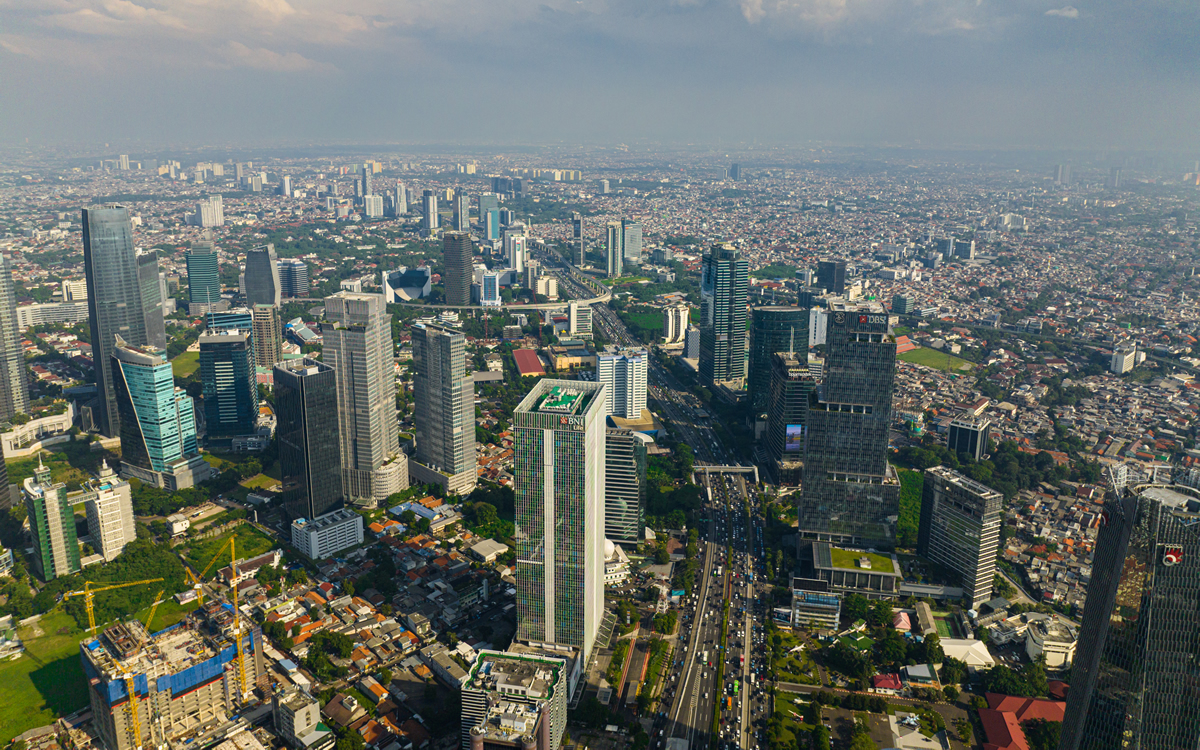
JAKARTA, Indonesia — Organizers of an LGBTQ+ and intersex event that was to have begun on Monday in Indonesia said safety concerns prompted them to cancel it.
Reuters reported activists from across Southeast Asia were to have attended the ASEAN Queer Advocacy Week in Jakarta, the Indonesian capital.
The ASEAN SOGIE Caucus, which is based in the Philippines, and Arus Pelangi, an Indonesian LGBTQ+ and intersex rights group, were among the groups that organized the event.
“The organizers have been monitoring the situation very closely, including the wave of ‘anti-LGBT’ sentiments in social media,” said the ASEAN SOGIE Caucus in a statement. “The decision was made to ensure the safety and security of both the participants and the organizer.”
“We affirm our call for ASEAN (Association of Southeast Asian Nations) and government stakeholders to create spaces for dialogue with marginalized groups, including those discriminated against on the basis of their sexual orientation, gender identity, gender expression and sex characteristics,” notes the statement. “Our joint vision of an inclusive ASEAN region is premised on the existence of safe spaces for civil society and for rights-holders to learn about the institution, to discuss issues that matter to them, and to collectively exercise our right to freely express our views on how ASEAN advanced, or not, the human rights of our community.”
The statement says “threats to the very existence of our lives and dignity are part of the everyday realities of LGBTQIA+ persons.”
“Online hate, direct attacks against human rights defenders, and reprisals to our exercise of civil and political rights, are issues we confront and must be dealt with by governments. We urge ASEAN human rights mechanisms to monitor and respond to these,” it adds. “In difficult situations where hate overshadows us, we rely on our collective strength as a community of human rights defenders. To LGBTQIA+ activists, be strong: Our collective strength as a movement will sustain our activism.”
The Washington Blade on Thursday spoke with ASEAN SOGIE Caucus Executive Director Ryan Silverio about the decision to cancel the Indonesia event.
“It is unfortunate that a civil society event to be conducted in private has been discredited and attacked online,” said Silverio. “We decided to change our plans to ensure everyone’s safety. Attacks against LGBTQIA+ human rights defenders is symptomatic of a growing hate in our region, and the continuously shrinking civic space.”
Special US envoy for LGBTQ+, intersex rights cancelled Indonesia trip in 2022
Consensual same-sex sexual relations are decriminalized in most of Indonesia, but officials in Aceh province in 2021 caned two men under Shariah law after their neighbors caught them having sex.
Authorities in Jakarta in 2017 arrested 51 people who were attending a “gay party” at a sauna. The closure of an Islamic school for Transgender people in the city of Yogyakarta the year before also sparked outrage.
Jessica Stern, the special U.S. envoy for the promotion of LGBTQ+ and intersex rights, cancelled her trip to Indonesia last December after the country’s most prominent Islamic group criticized it.
“ASEAN cannot deny us being their constituents,” Silverio told the Blade. “Recognition of our community who have been invisibilized, whose human rights are ignored, whose issues not addressed is long overdue.”
Southeast Asia
Frontrunner to be Thailand’s next prime minister celebrates Pride
“Once the government is formed we will support Marriage Equality (Act), Gender Identity (Act) and several others, including welfare”
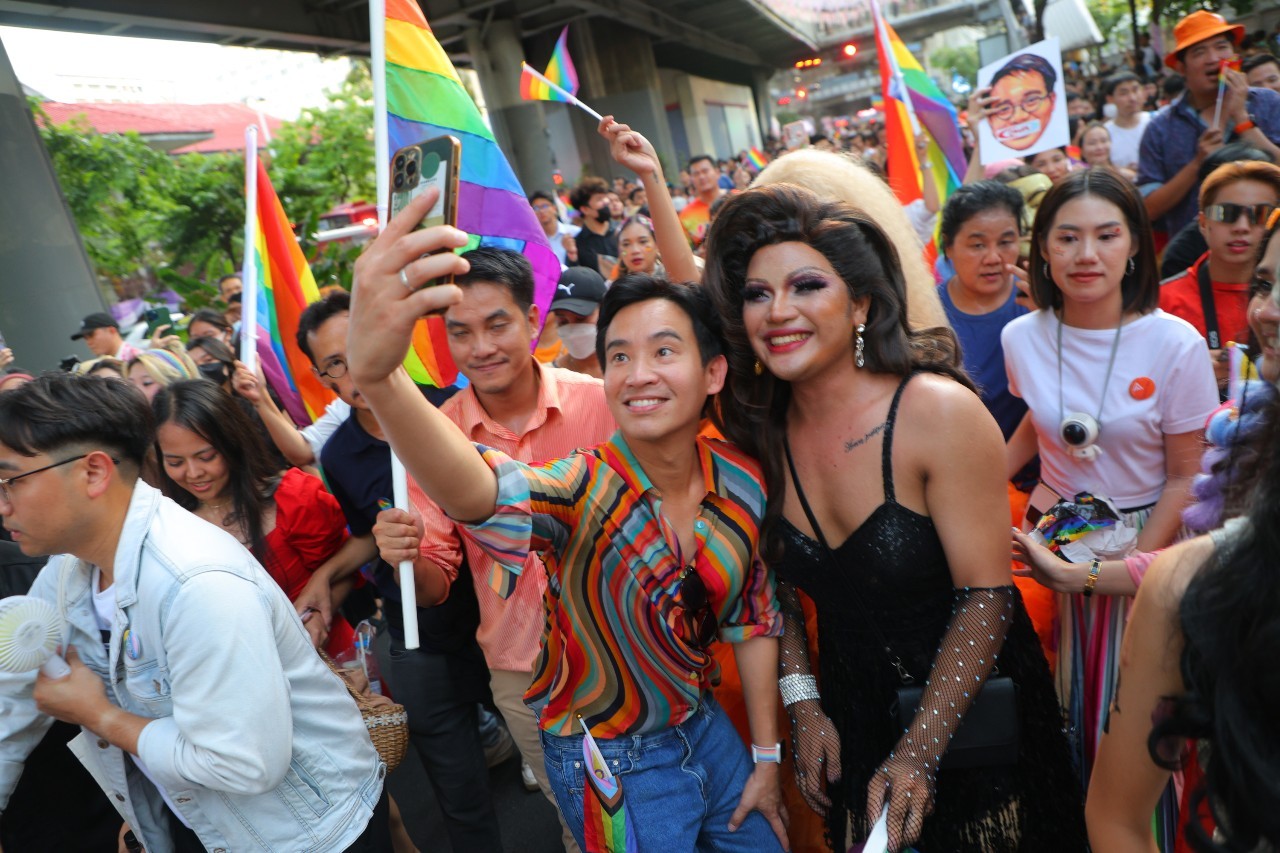
BANGKOK, Thailand – Pita Limjaroenrat, a member of Parliament and Leader of Move Forward Party, is assembling a coalition to govern this Southeast Asian country after winning the most seats in a May 14 general election. Limjaroenrat, his progressive party and its co-partners are promising to deliver on pledges to pass laws protecting the country’s LGBTQ+ people.
Limjaroenrat is expected to be named as Prime Minister, however, the Election Commission has 60 days to certify the results of the May General Election. The process for selection of a prime minister is complicated, under the 2017 Thai constitution prime ministers may only be chosen from a pre-declared list of candidates. Each party may submit up to three names and must have at least 25 members in the House of Representatives to receive eligibility.
Parliament’s vote for Prime Minister will take place in a joint session with the 250-seat Senate appointed by the junta, according to the constitution’s provisional terms later this summer.
Limjaroenrat has vowed to get the Marriage Equality Act through the parliament after the early drafts of the law and related legislation was stalled in the last parliamentary session under the government of Prayut Chan-o-cha i, who has served as the Prime Minister of Thailand since he seized power in a military coup in 2014.
Limjaroenrat took part in the second annual LGBTQ Pride parade in Bangkok, June 4, 2023. “Once the government is formed we will support Marriage Equality (Act), Gender Identity (Act) and several others, including welfare,” Limjaroenrat told reporters at the parade.
In a Facebook post he noted: (Translated)
Our country is driven by ‘love’, not ‘fear’.
.
‘Diversity’ is not a ‘weakness’, but a ‘strength’ of this country.
.
love is love and love must win
.
So #bangkokpride2023 It’s not just a month we come to celebrate. Not just a parade It’s about telling the world about the values we share.
.
I want to tell everyone that When can we form a government? Law #Equality Marriage Passed immediately in 100 days because it was a common agenda that was already recorded in the MOU of the coalition government.
.
But there are other policies that we will continue to push forward as management in various ministries. and as a legislative branch in the House of Representatives To create gender equality in Thai society.
.
all based on “The way forward” is to see that “people are equal” no matter who you are. We all have equal human dignity. equality before the law and must receive public services from the state fairly and equally not being discriminated against just because of differences in race, color, creed, education level poor status Physical status, disability, age, and if someone is weak and falls down, the society is ready to help and support each other. That was the society I dreamed of.
.
Even the journey of gender equality We have traveled a long way. But it’s just a small starting point. There is still a long way to go to reach everyone’s ideals, so don’t be discouraged, don’t be discouraged. Don’t think that this society can’t change anything. when everyone has contributed to make the change happen
.
This journey, if you look at it with your eyes, you may see that it is still a long way to go, but at least we can see the destination clearly in everyone’s heart.
Thailand is a popular destination in Asia for LGBTQ+ travelers as the Thai people are extremely welcoming people and have been embracing LGBTQ+ tourists for decades. However, LGBTQ+ rights groups say that the LGBTQ+ community still experience some forms of widespread stigma and discrimination. There is no legal recognition of transgender people and the law does not recognize marriage equality, although homosexuality is legal under Thai law.
Related:
Thailand Pride celebrations kick off in Bangkok – BBC News:
Southeast Asia
New Indonesia Criminal Code to criminalize sex outside of marriage
Country’s revised Criminal Code will take effect in three years
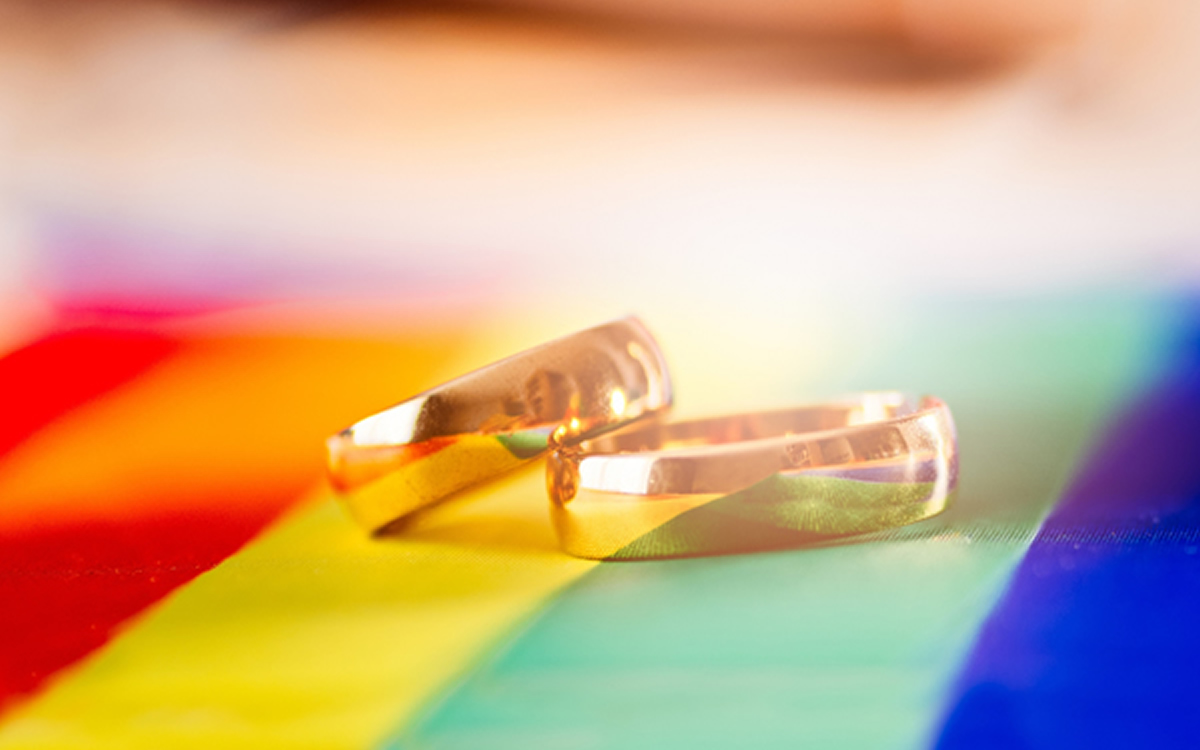
JAKARTA, Indonesia — Lawmakers in Indonesia on Tuesday approved a bill that would criminalize sex outside of marriage.
The Jakarta Post, an English newspaper in the country’s capital, noted the marriage provision is part of a revised Criminal Code that would, among other things, also make it illegal to insult the president. The Jakarta Post said anyone, including foreigners, who have sex outside of marriage could face up to a year in jail.
The new Criminal Code — which LGBTQ+ and intersex activists and other human rights groups have criticized — will take place in three years.
Consensual same-sex sexual relations are decriminalized in most of Indonesia, but officials in Aceh province in 2021 caned two men under Shariah law after their neighbors caught them having sex. The Indonesian government in recent years has faced criticism over its LGBTQ and intersex rights record.
Authorities in Jakarta, the Indonesian capital, in 2017 arrested 51 people who were attending a “gay party” at a sauna. The closure of an Islamic school for transgender people in the city of Yogyakarta in 2016 also sparked outrage.
Jessica Stern, the special U.S. envoy for the promotion of LGBTQ+ and intersex rights, had been scheduled to visit Indonesia this week. She cancelled her trip after the Indonesian Ulema Council, the country’s most prominent Islamic group, criticized it.
Southeast Asia
Lawmakers in Singapore repeal country’s colonial-era sodomy law
Constitutional amendment to define marriage as between a man and a woman approved

SINGAPORE — Lawmakers in Singapore on Tuesday repealed a colonial-era law that criminalized consensual same-sex sexual relations.
The Straits Times newspaper notes 93 MPs voted to repeal Section 377A of the country’s penal code after 10 hours of debate that spanned two days. A constitutional amendment that ensures marriage remains defined between a man and a woman also passed on Tuesday with 85 MPs voting in favor of it.
Prime Minister Lee Hsien Loong in August announced his country would decriminalize consensual same-sex sexual relations.
The city-state’s Court of Appeal in February upheld a lower court decision that dismissed three lawsuits against Section 377A of the country’s penal code. Home Affairs Minister K Shanmugam a few months later told the BBC his country will not prosecute anyone under the colonial-era law.
Southeast Asia
Singaporean court sends bisexual OnlyFans creator to jail
Titus Low was found to have violated Singapore’s obscenity laws & defying a order to stay off his account as law enforcement investigated

SINGAPORE – A 22-year-old bisexual man who is Singapore’s most recognizable adult content creator on OnlyFans was sentenced to spend three weeks in jail and ordered to pay a fine of $3,000 [USD] over his OnlyFans account by a local court.
Titus Low was found to have violated Singapore’s obscenity laws and defying a court order to stay off his account while local law enforcement investigated. The Singaporean media outlet, The Straits Times reported that Low is the first OnlyFans creator to have been prosecuted in the city-state which remain largely conservative on issues such as LGBTQ+ issues, abortion, casual sex and prostitution.
This past August Singapore Prime Minister Lee Hsien Loong announced his country will decriminalize consensual same-sex sexual relations.
“Private sexual behavior between consenting adults does not raise any law and order issue. There is no justification to prosecute people for it nor to make it a crime,” said Lee. “This will bring the law into line with current social mores and I hope provide some relief to gay Singaporeans.”
However, sale and production of pornographic materials is illegal although watching porn is not against the law. OnlyFans and other adult content available via online sites are restricted by state censors.
The case against the bi-OnlyFans creator was initiated in December of 2021 after a man filed a complaint with Singaporean police in which he stated he had found an obscene video of Low performing a sex act on the mobile phone of the complainant’s 12-year-old niece.
As part of his bail and release Low was ordered to stay off his account and not post further new content. In January of this year on his Instagram and Tik-Tok accounts Low posted a video where he pointed out that his videos were meant for his adult fans. “We only create content for people who are our age and wish to have content they want to see. And all this is on the basis of everything is consensual,” Low had said.
“So we don’t force you to watch our content, we don’t force you to pay, it’s not open for public consumption, and if I don’t impede on your life and your lifestyle, to the person who reported me, why are you impeding in mine?” he added.
His defense lawyer Kirpal Singh, argued that although proof of being 18 years-old was required to access and pay for viewing OnlyFans accounts, creators have little control over material being leaked or recirculated without their knowledge and that is not something they’re able to control. Singh added that it is impossible to prevent content on the platform from permeating social media, such as when a paying subscriber records an OnlyFans video with an external device.
During court proceedings the Straits reported that between April and October 2021 prior to his arrest, Low earned US$240,979 (S$346,475) from OnlyFans. Low argued in Court that the reason he had again accessed his account after being ordered to stay off the platform was it was his only source of income and that he felt that he had an obligation to provide content to his subscribers.
Singh in his direct examination asked Low why he defied the police order, Low testified that he had subscribers who had prepaid, and he felt obligated to supply content to them.
The Straits also noted that Low’s account currently has 208 posts and 338 media files an is now inactive.
In seeking the jail term and the $3,000 fine, Deputy Public Prosecutor Thiagesh Sukumaran told the court that Low’s actions were premeditated, and he intended to undermine police investigations to advance his financial interests over all else.
“He spun an elaborate story about his OnlyFans account being compromised to deceive the platform and regain access to his account. He also breached the police order more than once,” he said.
Following his sentencing, Low took to TikTok to address his fans. He said that he will start his prison sentence in a few weeks, but he “was glad the case was over” as it was taking a toll on his mental health. “All my heart is with you. Praying it will be smooth. Anything just call me. Thank you to everyone that reached out to me.”
@tituslow Replying to @Prrrth ♬ original sound – Titus Low
Low also updated his followers on Twitter. “I’m glad this is finally over. Ready to start in a new chapter in life Mistakes were made. Part of life’s learning process, I guess?”
So… I went to court today. I have to do 3 weeks & a 3k fine however I’m glad this is finally over. Ready to start in a new chapter in life 🙏
— Titus Low (@tituslow22) October 12, 2022
Mistakes were made. Part of life’s learning process, I guess? pic.twitter.com/ZhDCnkq6Dg
Southeast Asia
Vietnam no longer considers LGBTQ+ people sick
Country’s health ministry issued directive on Aug. 3
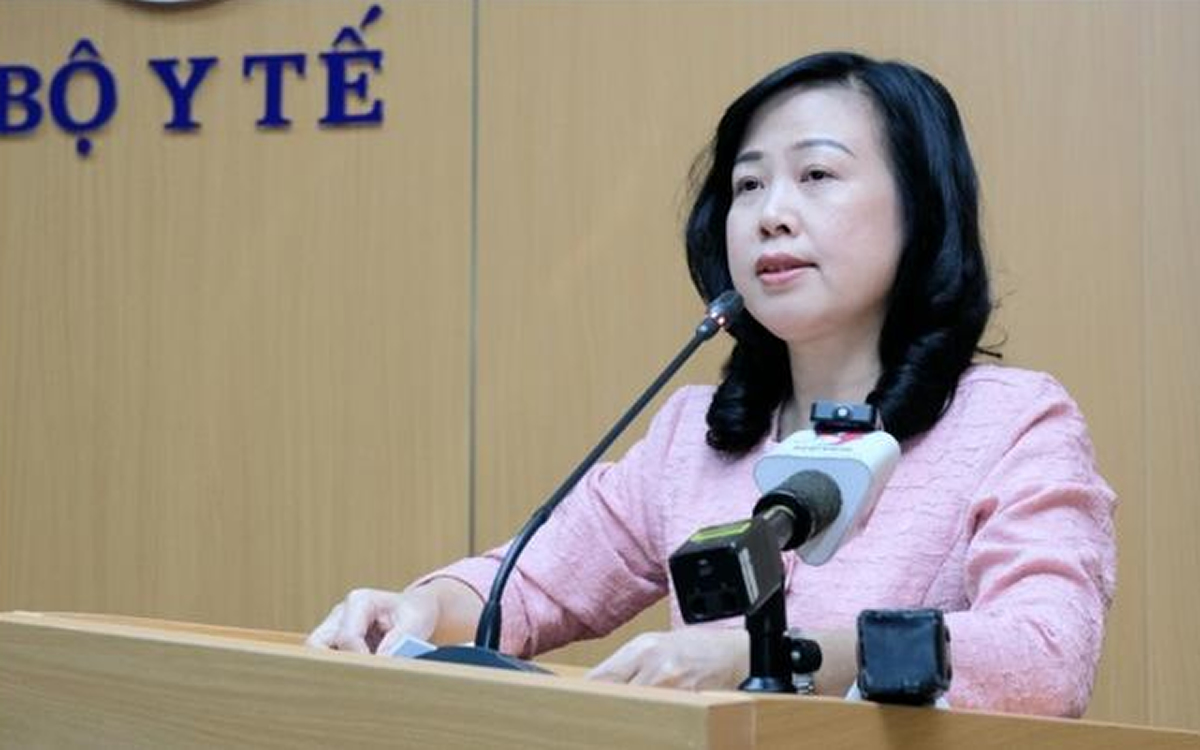
HANOI, Vietnam — The Vietnamese Health Ministry earlier this month announced it no longer considers LGBTQ+ people to be sick.
A directive the ministry issued on Aug. 3 directs health care providers “not to consider homosexual, bisexual and Transgender (people) an illness.” The directive also contains the additional four provisions:
• Enhance information propagation and dissemination so that the medical doctors, staff and patients at the medical examination and treatment establishments have a correct understanding about homosexual, bisexual and Transgender persons.
• While administrating medical examination or treatment for the homosexual, bisexual and Transgender patients, gender equality and respect must be ensured to avoid discrimination and prejudices against these groups.
• Not to interfere nor force treatment upon these groups (of patients) — if any, it must be in the form of psychological assistance and performed only by those who have the knowledge of sexual identity.
• To enhance the works of internal review and inspection towards the medical examination and treatment establishments and practitioners to ensure compliance with the professional codes in medical services according to the law.
The directive also notes homosexuality cannot be “cured.”
“The Vietnamese Health Ministry’s recognition that sexual orientation and gender identity are not illnesses will bring relief to LGBT people and their families across Vietnam,” said Kyle Knight, senior LGBT rights researcher at Human Rights Watch, in a press release his organization released on Aug. 18. “LGBT people in Vietnam deserve access to health information and services without discrimination, and the Health Ministry’s new directive is a major step in the right direction.”
Human Rights Watch in its press release notes Vietnam over the last decade “has made some progress on LGBT rights.”
The government in 2013 announced same-sex relationships are no longer “forbidden,” but LGBTQ+ and intersex couples still lack legal recognition.
Vice President Kamala Harris during a meeting with LGBTQ and intersex activists in Hanoi, the Vietnamese capital, last August noted the Health Ministry “helped craft the draft — and draft — the Transgender rights law” that took effect in 2017. The State Department’s 2021 human rights report people “who have undergone reassignment surgery the right to register their new status,” but a bill “to implement this was pending as of year’s end.”
Jessica Stern, the special U.S. envoy for the promotion of LGBTQ+ and intersex rights abroad, visited Vietnam in May.
-

 COMMENTARY4 days ago
COMMENTARY4 days agoUSAID’s demise: America’s global betrayal of trust
-

 a&e features4 days ago
a&e features4 days agoHow this Texas drag king reclaimed their identity through Chicano-inspired drag
-

 Obituary4 days ago
Obituary4 days agoThe queer community mourns the loss of trailblazer Jewel Thais-Williams
-

 Television3 days ago
Television3 days agoICYMI: ‘Overcompensating’ a surprisingly sweet queer treat
-

 Arts & Entertainment5 days ago
Arts & Entertainment5 days agoMary Lambert Returns With a Battle Cry in new single, “The Tempest”
-

 Breaking News1 day ago
Breaking News1 day agoProject Angel Food loses $340,000 grant to feed people living with HIV
-

 Opinions2 days ago
Opinions2 days agoThe psychology of a queer Trump supporter: Navigating identity, ideology, and internal conflict
-

 Breaking News1 day ago
Breaking News1 day agoTrump administration sues California over trans student-athletes
-

 Living2 days ago
Living2 days agoFaithfully queer: Finding God and growth in Modern Orthodoxy
-

 COMMENTARY13 hours ago
COMMENTARY13 hours agoWhat if doctors could deny you insulin for being gay?





